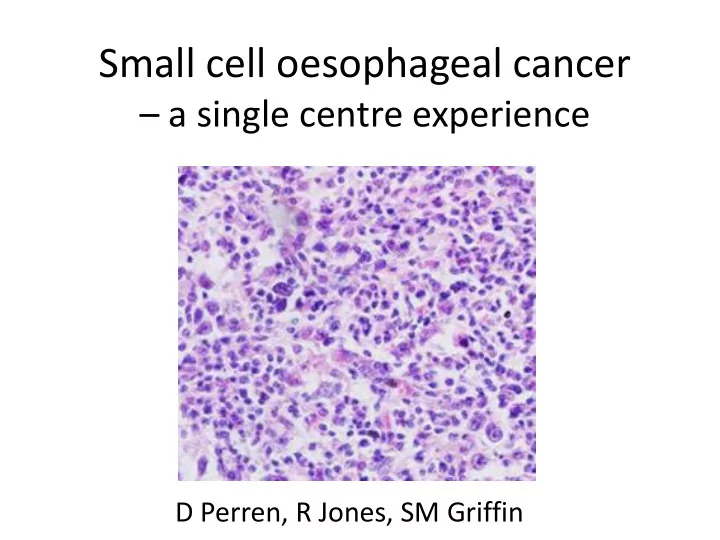

Small cell oesophageal cancer – a single centre experience D Perren, R Jones, SM Griffin
Small cell cancer • Aggressive solid organ malignancy arising from primitive neuroendocrine cells • ~15% of lung cancers • 1-2.5% of oesophageal cancers – Small series from large centres Massachusetts General Huncharek et al n=13 1995 Cardiff Hudson et al n=16 2007 Memorial Sloan-Kettering Ku et al n=25 2008 Beijing Tao et al n=39 2015
Small cell lung cancer • Staging (Zelen, 1973) – Limited (LD) - within a tolerable radiotherapy field – Extensive (ED) • Treatment (NICE CG 121, 2012) – LD • 4-6 cycles platinum-based combination chemotherapy and radiotherapy – ED • platinum-based chemotherapy • radiotherapy if complete response at distant sites and good partial response in chest
Aims • To review our experience of oesophageal small cell cancer within a high-volume MDT
Methods • All prospective cases of oesophageal small cell cancer identified from 1993-2014 • LD and ED staging definitions adopted from lung cancer literature • Cases identified using departmental and regional (NYCRIS) databases • Cases of dual histopathology included
Results • 43 cases of oesophageal small cell carcinoma • 21 male, 22 female; median age at presentation 69.0 years • 70% smokers • Metastases at presentation in 43.9% • Account for 0.65% of all oesophageal cancers
Metastasis
Treatment received Treatment n Median survival Chemotherapy + radiotherapy 16 13.5 months Chemotherapy alone 6 6.5 months Radical radiotherapy 2 14 months Oesophagectomy 3 12 months Best supportive care 13 1 month
Survival Median survival: 8 months
Survival by stage Median survival: 5.5 months ES, 12 months LS Difference in survival statistically significant: p=0.014
Survival by treatment Difference in survival statistically significant: p<0.001
Survival – individual value plot
Case studies Three patients have survived longer than 3 years. None had metastasis at presentation. 1. Treated with palliative chemotherapy with excellent response. Consolidation radiotherapy. Died disease free, of unrelated causes after 84 months. 2. Treated with palliative chemotherapy and consolidation radiotherapy. Following recurrence re-challenged with epirubecin, oxaliplatin, capecitabine. Still alive and disease free at 69 months. 3. Palliative chemotherapy. Excellent response, so given radical radiotherapy and prophylactic whole cranial irradiation. Alive and disease free at 56 months.
Summary • Largest single institution series of oesophageal small cell cancer • No evidence of a role for resection • With chemoradiotherapy, a small minority will survive for 2-3 years
Recommend
More recommend